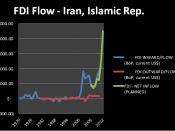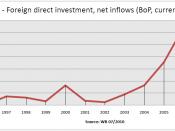A foreign investment (FDI) is a company controlled through ownership by a foreign company of foreign individuals.
Control must accompany the investment; otherwise it is a portfolio investment.
Companies want to control their foreign operations so that these operations will help achieve their global objectives. Investors who control an organization are more willing to transfer technology and other competitive assets. The idea of denying rivals access to resources is called the appropriability theory.
Governmental authorities worry that this control will lead to decisions contrary to their countries' best interests.
Direct investments usually, but not always, involve some capital movement.
There are two ways companies can invest in a foreign country. They can either acquire an interest in an existing operation or construct new facilities.
Buy: Depends on which companies are available for purchase; difficulty to transfer resources or acquire resources for a new facility; the goodwill and brand identification; easier access to local capital; market does not justify added capacity; immediate cash flow.
Build: Depends on difficulty to find a company to buy; little or no competition; local governments prevent acquisition; acquisition less likely to succeed (inefficient); local financing easier to obtain for building.
Whether a company first transfers capital or some other asset to acquire a foreign direct investment, the asset is a type of production factor. Production factors: capital, technology, trademarks, managers, raw material, ....
If trade could not occur and production factors could not move internationally, a country would have to either forgo consuming certain goods or produce them differently, which in either case would usually result in decreased worldwide output and higher prices. In some cases, the inability to use foreign production factors may stimulate efficient methods of substitution.
If finished goods and production factors were both free to move internationally, the comparative costs of transferring...



Foreign Direct Investment (FDI)
As someone who invests heavily in various markets, I can say that this paper is accurate, informative, and a strong research tool...Great Job.
4 out of 4 people found this comment useful.